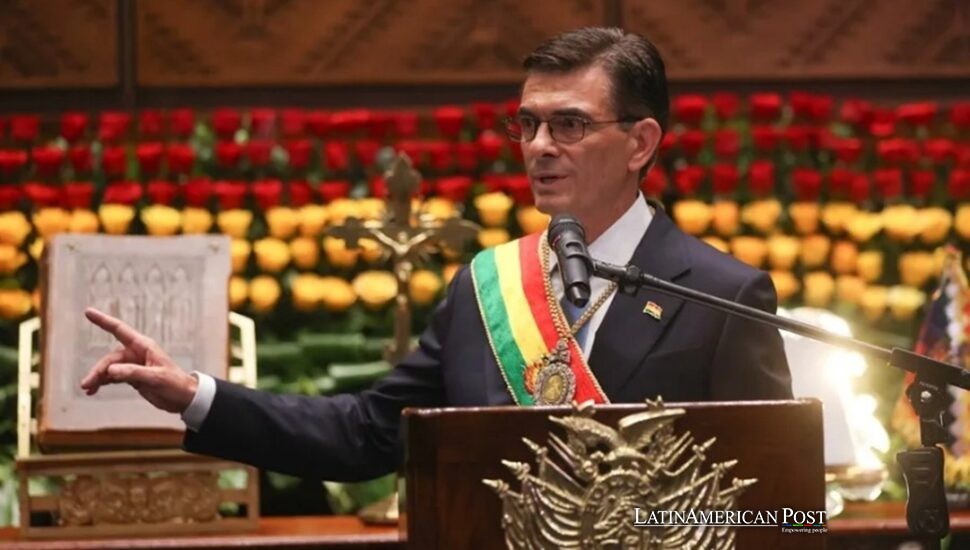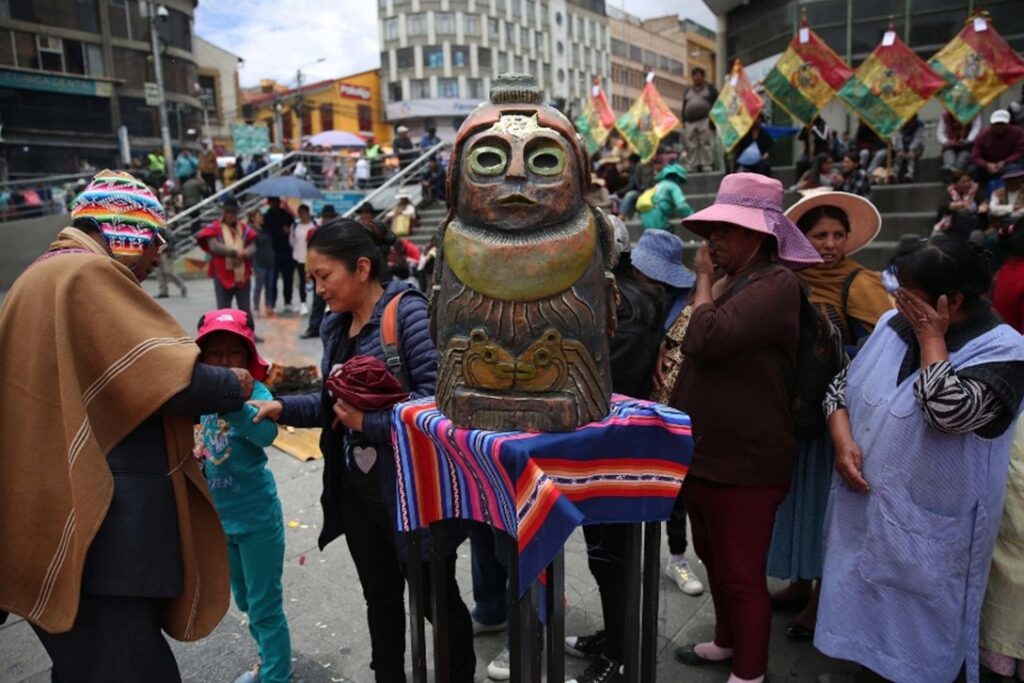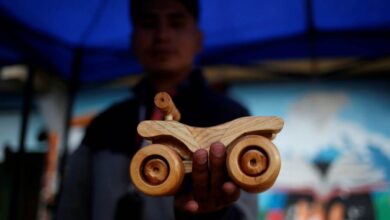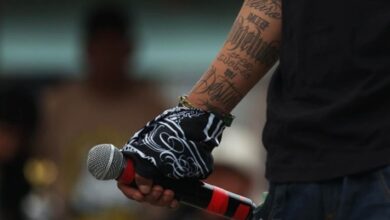Bolivia's Rodrigo Paz Faces a Nation on Empty: Gas, Dollars, and Trust Running Out

Sworn in Saturday, President-elect Rodrigo Paz inherits a country short on fuel, foreign currency, and patience. Promising a diplomatic thaw and a pragmatic fight against crime, the new leader must rebuild an economy running on fumes.
An Economy Built on Gas Is Running on Fumes
Bolivia’s new president steps into office with an economy that once promised abundance but now scrapes by on memory. For two decades, natural gas financed social programs, public works, and political calm—the engine of a model celebrated across South America. But the well is running dry.
Production has fallen from 61 million cubic meters per day in 2014 to just 29 this year, and the foreign revenue that once poured into state coffers has evaporated. According to figures cited by EFE, gas exports, which once earned $6.1 billion in 2013, have plunged to just $788 million between January and August. The shortage of dollars that followed has filtered into every pocket: businesses can’t import, gas stations ration diesel, and families face the highest inflation in two decades—18.3 percent in the first nine months of the year, more than double the government’s projection for all of 2025.
The crisis has reshaped daily life. Long lines at pumps have become routine. Bank windows display signs that read “No dollars today.” On social media, citizens swap currencies at black-market rates that climb by the hour. “It’s not just an economic problem, it’s psychological,” a La Paz shopkeeper told EFE. “People wake up wondering if they can fill the tank.”
In search of breathing room, Paz traveled quietly to Washington and Bogotá, meeting with the Inter-American Development Bank, the IMF, and the Development Bank of Latin America and the Caribbean. The result, EFE reported, is a $3.1 billion financial package—a bridge loan to keep the government solvent while structural fixes begin. Yet even he admits that cash is only a tourniquet. The deeper task is to restore faith: in Bolivia’s currency, in its energy sector, and in the idea that tomorrow won’t cost more than today.
A Foreign-Policy Reset Begins With Washington
After a razor-thin runoff win, Paz framed his presidency with a simple promise: “Put Bolivia in the world and bring the world to Bolivia.” His first step is thawing the diplomatic freeze that has isolated the country for two decades.
Last month, he flew to Washington for meetings that his office described, in comments to EFE, as “the start of a new stage” in U.S.–Bolivia relations. It was a scene unimaginable under Evo Morales or his successor, Luis Arce, whose governments expelled American agencies and courted leftist allies from Havana to Caracas.
Paz has made clear that Bolivia’s new foreign policy will be pragmatic, not ideological. He declined to invite Cuba, Nicaragua, and Venezuela to his inauguration, a gesture that immediately triggered Bolivia’s suspension from the ALBA bloc but signaled a break from the past. “We will maintain relations only with governments that respect democracy,” he told EFE.
The calculus is risky. In the polarized landscape Morales left behind, suspicion of Washington runs deep, and opponents can weaponize any sign of alignment. Yet Paz believes engagement is essential if Bolivia is to reopen markets, attract investment, and cooperate on energy transition and border security. A reset could also diversify trade away from gas and minerals, anchoring the economy in agriculture, lithium, and tourism. The question is whether the pivot toward Washington can succeed without alienating a domestic base that still equates sovereignty with distance.

Security, Cartels, and the Cost of Impunity
Even as he talks diplomacy, Paz faces a domestic enemy that ignores borders. “Organized crime has taken advantage of our institutional weakness,” he told EFE shortly after his victory. His words echo a growing national anxiety: Bolivia, once considered a corridor, is becoming a hub.
Authorities have linked members of Brazil’s Primeiro Comando da Capital (PCC) to Bolivian trafficking networks. At the same time, the Uruguayan fugitive Sebastián Marset—a high-profile drug lord—was discovered living comfortably under false documents in Santa Cruz. For many Bolivians, those revelations proved how far impunity has spread.
Paz says he will work with “any international partner” willing to help dismantle these networks, EFE reported, but the commitment stirs ghosts. The last time Bolivia collaborated closely with the United States, under anti-drug programs in the early 2000s, accusations of overreach and human-rights abuses led Morales to expel the U.S. DEA in 2008. Now, left-leaning factions fear its return.
Analysts interviewed by EFE argue that the new president must balance enforcement with reform—strengthening courts and financial-crime units while avoiding the militarization of rural areas. Success would mean more than safer streets. It would also restore investor confidence and reduce the shadow economy, which drains public revenue. Failure could cement the perception that the rule of law in Bolivia is negotiable.
Governing Without a Majority, Building a Mandate
The political arithmetic is as daunting as the economics. Paz’s Christian Democratic Party holds the largest bloc in Congress but not an outright majority, forcing him into alliances with four smaller forces. Ahead of the runoff, businessman Samuel Doria Medina’s Unidad party endorsed him, while former president Jorge “Tuto” Quiroga promised “constructive opposition” and offered legislative cooperation, EFE reported. Their support has allowed Paz’s allies to chair both chambers, but the honeymoon will be short.
Every reform—fuel subsidies, tax changes, judicial appointments, public enterprise audits—will require negotiation. The MAS, bruised but unbroken, still commands deep loyalty among rural voters and unions. A single misstep could turn gridlock into paralysis.
Paz’s best asset may be urgency. The crises confronting him—empty pumps, scarce dollars, soaring prices—leave little room for ideological theater. His early success will depend on small, visible victories: shorter fuel lines, steady exchange rates, and a credible plan to revive gas output. Each improvement buys him time and legitimacy.
“Confidence multiplies,” a political scientist in La Paz told EFE. “But it disappears faster than fuel.”
The new president knows this. His inauguration speech ended not with applause but with a promise to “make Bolivia governable again.” The phrase carried a quiet challenge: in a country where faith in institutions has drained like its gas fields, Rodrigo Paz must prove that renewal is still possible—one dollar, one alliance, one breath of trust at a time.
Also Read: Chile Turns Right as Crime Anxiety Reshapes Political Map





